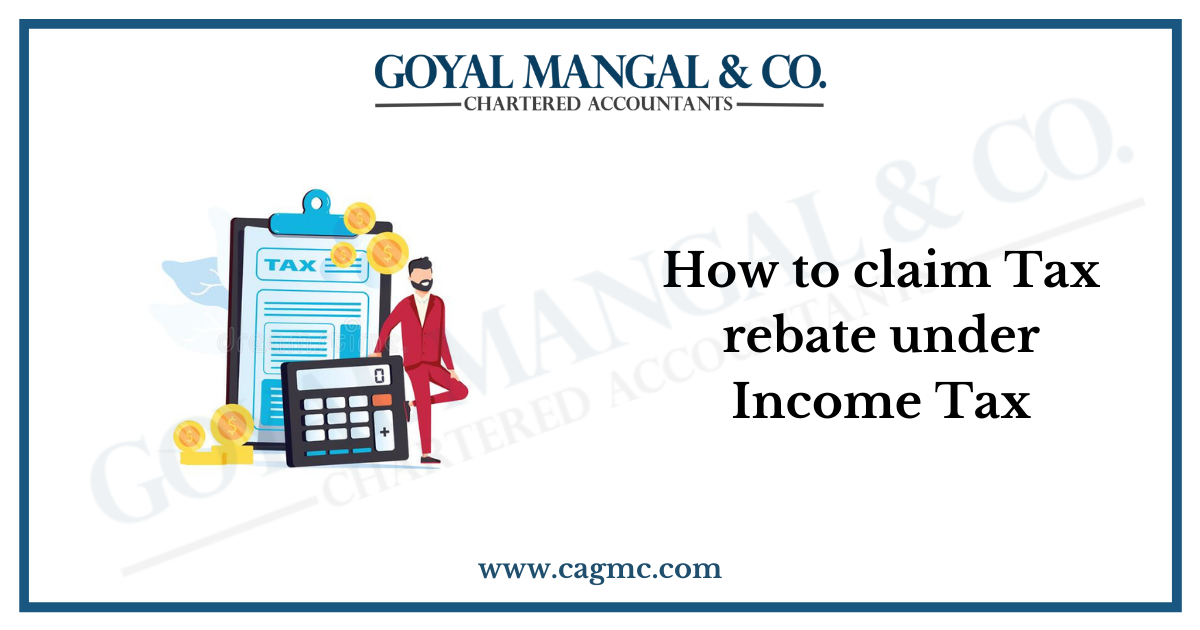| Content
What are the types of tax rebates available in India? Who is eligible to claim tax rebate? |
Meaning of tax rebate
Tax rebate is a form of tax incentive provided by the government. In India, the tax rebate is provided under section 87A. In other words a tax rebate is a refund on taxes. A refund is received by the taxpayer if they have paid more taxes than they owe.

To claim these refund or rebates the taxpayer should file their ITR within the specified date.
Types of tax rebates
In India different types of tax rebates are available of chapter VI of IT act are:
- 80C
- 80D
- 80DD
- 80CCC
- 80CCD
- 80EE
- 80TTA
- 80G
- 87A etc.
Section 87A, provides taxpayers with an income tax rebate of Rs 2500, provided the total income is less than Rs 3, 50,000.
From the F.Y the tax rebate has been extended to 12500, provided the total income is less than Rs 500,000.
This means that if the total income of individual gets more than 3, 50,000 or 500000 then that individual cannot claim tax deduction under section 87A.
If the total tax of income after adding health and education is less than the tax rebate then no amount will be taxable.
Eligibility
Taxpayers with income less than the threshold limit are eligible for tax rebate under section 87A. Following taxpayers are eligible to claim tax rebate under section 87A:
Under Section 87A FY 2019-20 i.e. A.Y 2020-21
- Should be Resident individuals
- The net taxable income should be less than the threshold limits i.e. Rs 500000 for assessment year 2020-21 (financial year 2019-20).
The tax rebate will be up to 12500
Under Section 87A FY 2018-19 i.e. A.Y 2019-20
- Should be Resident individuals
- The net taxable income should be less than the threshold limits i.e. Rs 350000 for assessment year 2019-20 (financial year 2018-19).
The tax rebate will be up to 2500
*Rebate under section 87A will be applied to the total tax before adding the health and education cess of 4%.
If TDS (tax deducted at source) is deducted and deposited more on your income then you can claim the refund by filing the ITR.
The due date for individuals to file ITR is usually 31st July of each assessment year which has been extended to 30 November 2020 due to COVID-19 pandemic.
Person not eligible to claim rebate
The following taxpayers cannot claim rebate:
- Non-residents or NRIs.
- Taxable income is more than the threshold limit mentioned above.
- Taxpayers other than individuals – like HUFs (Hindu Undivided Family), firms and companies.
*The tax rebate under this section does not affect the tax slab rate, i.e. irrespective of the threshold limit for tax rebate under section 87A; the tax rate remains the same.
FAQs on tax rebate
- What is the condition to avail 87A tax rebate for financial year 2019-20?
Ans. One can avail the 87A tax rebate for the financial year 2017-18 by fulfilling the two basic conditions:- The total taxable income after giving effect to all the applicable Chapter VI – A deductions like 80C, 80D, 80DD, 80G etc is less than Rs. 5lakhs
- And the individual should be a resident of India for that Previous Year.
- I can an NRI can I take tax rebate?
Ans. No, only person resident in India is eligible to take tax rebate under section 87A. - What if my employer deducts more TDS?
Ans. If TDS (tax deducted at source) is deducted by your employer is more than the actual liability then you can claim the refund by filing the ITR.


